Original Works of Fiction, News and Information from Author Cody D. Campbell
Don't wanna be here? Send us removal request.
Text
Free Sample Story: Little Bugs

Hey friends. I'm giving away a free digital copy of Little Bugs to anyone who signs up for my mailing list! This is a short sci-fi story about a young woman who ventures into a forest that has been closed due to toxic contamination for years. Now, the woods are open again thanks to the efforts of government-owned nanobots that have been cleaning the pollution. This story and others will be featured in my collection Echoes of the Arcane which launches April 15. https://dl.bookfunnel.com/a60dx7zzt9
1 note
·
View note
Video
youtube
Echoes of the Arcane is a collection of short science fiction and fantasy stories by award-winning author Cody D. Campbell. The places and times where these stories are set range from ancient worlds of magic to distant dystopian futures. They have different perspectives and voices, different magic systems, and scientific frameworks, but many of them revolve around a common theme—loss.
This collection is currently available for preorder from Barnes & Noble and on the Kindle App. Paperbacks will be available from Amazon and Independent bookstores when it launches on April 15, 2024.
0 notes
Photo
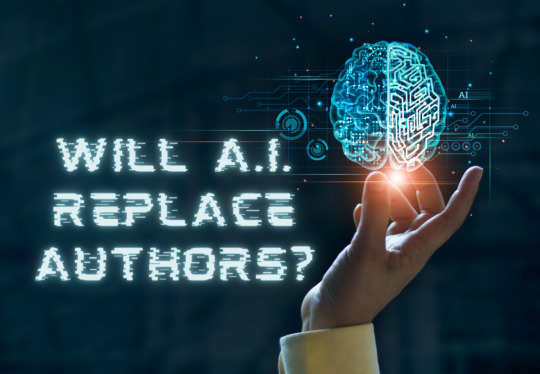
(via AI and the Future of Fiction)
0 notes
Video
youtube
Echoes of the Arcane Cover Reveal Echoes of the Arcane will be available in eBook and paperback formats starting 4/15/24. This is a collection of short fiction that includes works of sci-fi and fantasy by Pacific Northwestern author Cody D. Campbell. You can preorder the eBook now through Amazon and it will soon be available in several independent bookstores.
Amazon Link: https://a.co/d/8j3e506
#book cover#books#short stories#cover reveal#scifi#fantasy#poetry#author#book release#writer#reading#reader#trailer#ebook#kindle#goodreads
0 notes
Video
youtube
My book finally has a release date!
0 notes
Video
youtube
skl.sh/39im8gT
1 note
·
View note
Photo
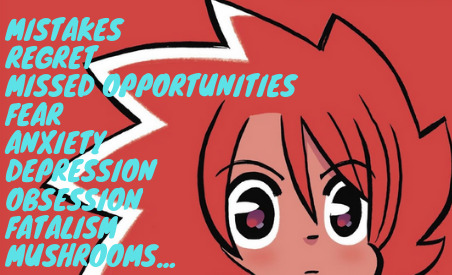
“She woke up, and there was a glow.”
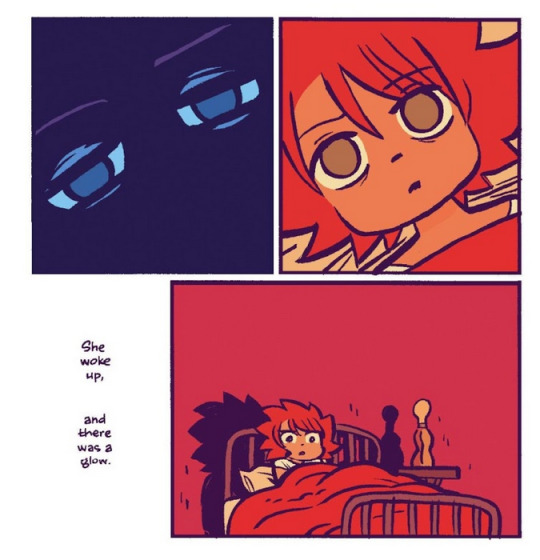
This is the first line in Brian Lee O’Malley’s 2014 graphic novel, “Seconds.” The protagonist, Katie, groggily opens her eyes and stares at the ceiling for a moment, disoriented, before realizing that something strange is going on. You can see the first sparks of awareness slowly building into curiosity and alarm, as both she and the reader realize that something out of the ordinary is happening. Then you turn the page, and find a small, unusual looking girl squatting on her dresser. There is no dialogue, only the exchange of panicked expressions as these two notice each other for the first time.
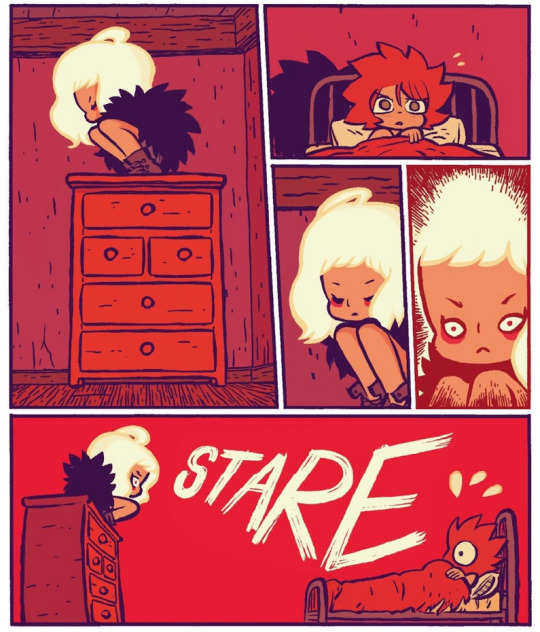
As the author of the Scott Pilgrim series, this isn’t the first time that O’Malley has played with disorientation, confusion and distraction in the perspectives of his characters. He likes the unreliable narrator because he can use them to show us how we lie to ourselves and how our perspectives are often distorted when we are tired, drunk, ashamed or simply not paying attention. We all see ourselves as the narrators of our own stories and many of us “self edit,” either choosing to look at the choices we’ve made from a perspective that makes us look good, or else punishing ourselves by blowing mistakes out of proportion.
Check out these two scenes from Scott Pilgrim. The first is from Volume 2, “Scott Pilgrim Vs. The World.”
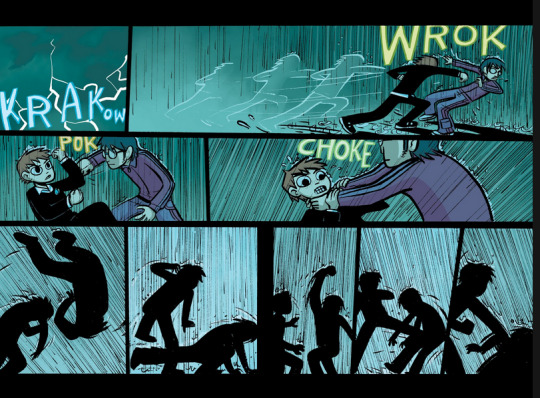
This depicts the way Scott remembers battling Simon Lee, a villainous boy from a rival school who had kidnapped Scott’s then friend, Kim Pine, and held her hostage. Now compare it to the way Kim tells the same story in Volume 6, “Scott Pilgrim’s Finest Hour.”
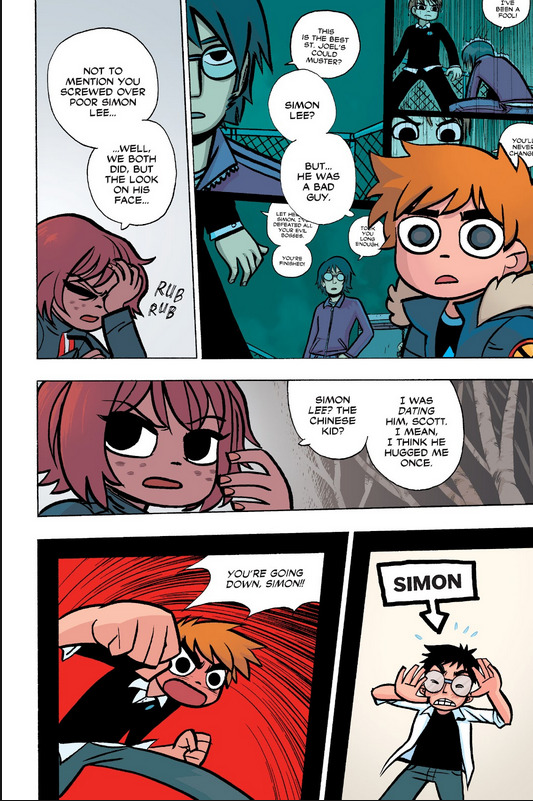
Simon wasn’t the villain Scott wanted him to be. He was actually Kim’s boyfriend at the time and hadn’t done anything wrong. Scott was the aggressor. He then rewrote the story in his mind in order to cast himself as the hero. He needed to be able to think in these terms in order to cope with the guilt because at his core, Scott doesn’t want to be a bad person.
“Seconds” takes this kind of narrative introspection in a slightly different direction however. Instead of focusing on guilt as the main aspect of Katie’s “self editing,” it focuses on regret. That might seem like splitting hairs since guilt can be considered a form of regret, but it’s kind of like how all pinkies are fingers, but not all fingers are pinkies. Katie’s life is a tangled web of missed opportunities, mistakes, and a general sense that she doesn’t feel like she’s living up to her own potential.
Then she’s confronted with something that we’ve all wished for at one point or another, the opportunity for a “re-do.”
At this point I’m going to stop and let everyone know that there are going to be some spoilers ahead. I’m going to try my best to avoid anything that I feel would ruin the story, but you should stop reading now if you haven’t read “Seconds” and want to go into it with a completely blank slate.
OK, everyone want to keep reading? Good!
So here’s a brief overview of the premise.
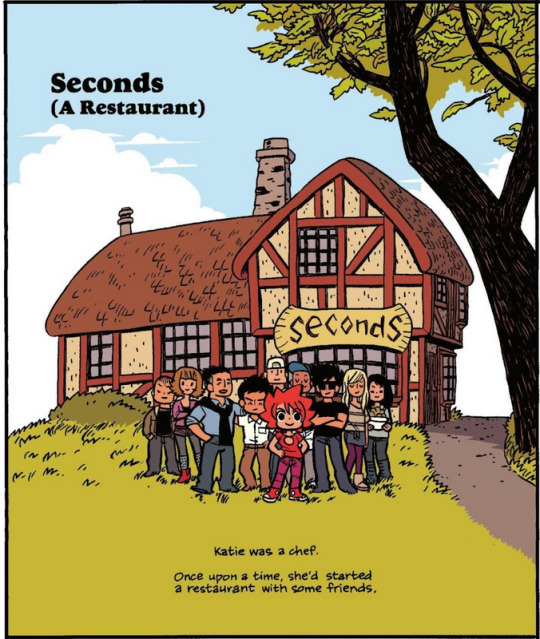
Katie and a group of friends opened a restaurant called “Seconds” a few years before the story begins. She was the Chef and her food put Seconds on the map, but she wasn’t one of the owners, so it was never really hers. Now she’s finally purchased her dream location, an old rundown building that she plans to convert into a new restaurant and rebrand “Katie’s.” She’s very excited about her new place, but the renovations keep taking longer and costing more than she’d originally anticipated. This leaves Katie in an awkward sort of limbo between major career shifts. On the one hand, her new place isn’t open yet and so she can’t start working on her new menu or serving customers. On the other, she’s already trained the new Chef to replace her at Seconds, so she doesn’t really have a place in the world.
This is also reflected in how Katie feels about her age.
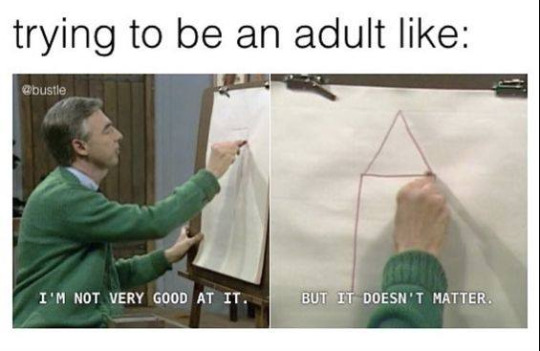
For a lot of Millennials, our 20s are viewed as a sort of proto-adulthood. It’s a time of experimentation, where it’s OK to not feel like you know you’re life-path. It’s OK to rent a tiny apartment, stay in bed streaming television on your days off and dress like you’re in high school. It’s ok to still call your parents for help with simple things every once in a while, like not knowing how to fix a clogged sink or pay an electric bill. It’s OK to be working a job that pays your rent with a little left over to buy video games or to break up with a long term romantic partner and see what else is out there. You don’t need to have everything together yet. You have time.
30 is a different animal.
I’m not saying this is true at all. Lord knows everyone’s circumstances are different. It takes some of us a lot longer than others to discover our purpose in the world, and still others never do. Arbitrary age limits like this don’t really mean anything, but there is a social pressure that says when you hit the big 3-0, this is where you’re supposed to be a real, honest-to-god, adult now.
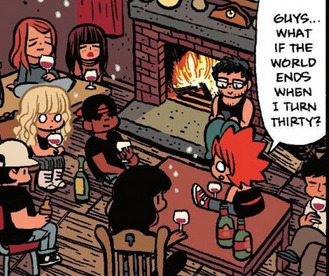
Katie denies it, but this sort of terminal anxiety is at the heart of her character. She’s terrified of the incoming change, terrified of the passage of time and fixated on her regrets of everything that brought her to this point.
Enter Lis.
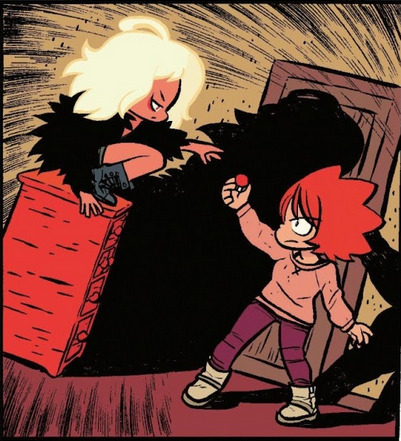
Lis is a house spirit, the embodiment of Seconds, and everything that has ever happened there. (Think Ghost of Christmas Past meets Fairy Godmother.) When an accident happens in the kitchen, Lis offers Katie a mushroom that will allow her to re-write one of her past mistakes, giving her a second chance. (Seconds! Get it?) This works out well enough, with only some mild side effects, but then Katie uncovers a whole bunch of the mushrooms growing in Seconds’ basement. Despite Lis’s warnings, Katie proceeds to go back and rewrite bigger and bigger events in her own past, trying to perfect her present, but the more she goes back, the more things start to change in unexpected ways.
I won’t go into the details, but the story illustrates brilliantly how doing things differently will still result in just as many unexpected consequences as the way we did them the first time, sometimes causing new problems and new mistakes that you couldn’t have anticipated. It shows us how spending too much time and energy reflecting on how we got to where we are can be detrimental to crafting our future.
You can learn from your past and grow, but only if you accept your mistakes for what they are… a part of you.
None of this even touches on the adorable and energetically drawn panels, the thoughtfully crafted and deeply expressive characters or the hilariously written dialogue. I could honestly write three or four more blogs just as long as this one on all the other things that make this book great.
In case you couldn’t guess by now, I heartily recommend you give this story a try. It’s cute, funny, smart, thoughtful and nearly every other positive adjective that I’m not clever enough to list without a thesaurus. It’s also considerably shorter than the Scott Pilgrim series at only one volume, so it’s a great way for you to dip your toe into O’Malley’s work if you’re looking to give it a shot, but aren’t sure if you want to commit to starting a six volume series.
But I’m curious to hear what you think. I hope those of you who’ve already read it will leave a comment and let me know your opinions… and I hope those of you who haven’t will let me know if this is the sort of thing that you’d be willing to give a shot.
This is also a new format for my blog, so I’d appreciate any feedback on whether you’d like to see more of these kinds of reviews in the future.
Thanks for reading everyone,
-Cody For other reviews like this one, check out my website at: codydcampbell.com
4 notes
·
View notes
Text
The Advertising Wyrm (Ft. Final Fantasy XV)
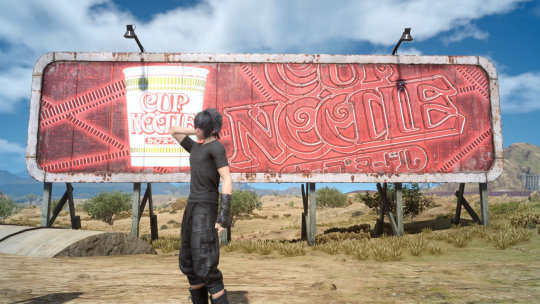
Hi Everyone,
So I’ve been thinking a lot about advertising in non-physical media lately. Nobody really likes advertisements (except during the super bowl for some weird reason) and it seems like if you ask people whether or not they want advertisements in their movies, TV shows, podcasts, internet videos, ect., an overwhelming majority of people will probably say no.
Don’t get me wrong. I don’t like them either. There’s nothing like an Axe Body Spray commercial trying to tell me all I need in order to be drowning in women is a can of their middle school skunk juice to really take me out of my viewing experience. They can’t mace you if you mace yourself first!
But there are times when I understand why advertisements are necessary. Radio was probably the first great example. No one pays for radio, but people wanted to be able to tune in and here music, talk shows and news. Sure, there were some hobbyists who were willing to broadcast for free, but income was (and is.. that’s right, radio is still a thing!) necessary for most stations. Equipment, facilities and talent all cost money. So how do you make money when no one is paying for your service?
You sell ad-space.
And that’s a pretty fair deal. You get free media, and in exchange, you spend some of your time listening to businesses that financed said media so you don’t have to. You can crank the Stones, or Kelly Clarkson (or whatever the hell kids are into these days) and then suffer through a brief message from Crazy Willy’s no-down, low-low APR car loans before going back to your morning commute jams.
I personally love a good podcast. One of my favorites, a Dungeons and Dragons podcast called The Adventure Zone, has a commercial break in the center of every episode that I happily listen through, knowing that it’s financing a product that I’m not paying for. Similarly, YouTube ads can help pay content producers on all those cat videos and swimsuit fails you watch for free.

(This one is a video of a cat watching a swimsuit fail)
TV started out with a similar set up, but that changed with the advent of cable. They offered more channels and clearer reception in exchange for a subscription, but the commercials didn’t go anywhere. You were now paying the cable company directly AND viewing ads.
To be fair, this was initially an optional upgrade and the cable companies didn’t necessarily pay the networks that were producing the content, so in a way you were paying in two separate ways for two separate services.
The problem is that once people got used to this system, it opened up the gateway to a whole bunch of other services. You might buy a movie ticket and be forced to sit through ads before getting to see the film (reminder, Coka-Cola asks you to please silence your phone) or you might be paying for a streaming service like Hulu and still have to sit through ads. In both of these instances, you are paying twice. Hulu tries to justify this by arguing that they do this in order to offer a discounted service and gives you the option to pay extra for less or no ads, but it still feels like your paying to watch advertisements and that’s never a good feeling.
This gets even more insidious with Final Fantasy XV.
That’s right nerds! I’m bringing a video game into my advertising rant!
In the game you play Noctis, the leader of a group of four young men on a road trip to save the world… or something. You ride in a car that was replicated by Audi in conjunction with the games release, regularly stop to make camp using Coleman brand tents, stoves, chairs, cutlery and mugs, the American Express logo appears in business windows within the game, all of the characters clothes were designed and are sold IRL by a Japanese fashion label called Roen… and then there’s the worst offender. Those of you who’ve already played the game know exactly what I’m talking about.
Cup-F***ing-Noodles.
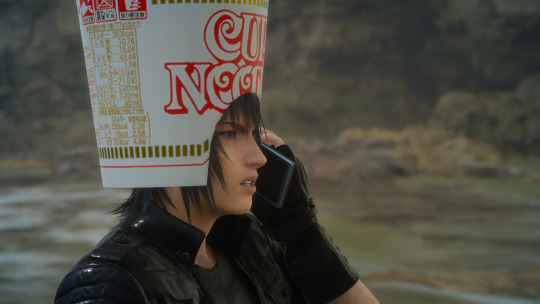
These little bastards are all over this game. There are billboards for them. There’s a truck that sells them as a consumable item on the boardwalk. Noctis, the prince of a warring nation and solemn hero of your journey, can get a hat (as part of a free DLC) shaped like a Styrofoam cup with the branding printed boldly across its front. But this is probably the most egregious offender of all.
youtube
Now, there were a lot of people who this didn’t bother. It seemed relatively harmless and even funny at times. Memes spread across the internet like lazily Photoshopped wildfire.
But the problem is that Square Enix didn’t put these products in your game to be funny or because they thought they flushed out the story. The ads did the opposite. Every time these products appeared on screen, they were instantly immersion breaking. They immediately took me out of the story and the fantasy world that the writers had worked so hard to produce and made me very aware that I was being sold something.
That pissed me off because I’d already bought something. THE GAME!
I’d spent $60 of my own hard earned dollar bills on a plastic disk, not knowing that I was going to spend the next ~100 hours in a fantasy world with real world ads. Square Enix is not a struggling company trying to find a way to finance their product. They are one of the largest video game publishers on the planet. This is nothing more than unadulterated corporate greed, steamed in a disposable cup.
But I acknowledge that my experience doesn’t reflect everyone’s. As I said before, many were unbothered or even amused by the company selling their soul to shrimp flavored capitalism. Other games have implemented product placement in the past, Final Fantasy XV is just the most shameless example. Still though, you have to admit that this could prove problematic going forward.
The more we get used to this sort of thing, the more we’re going to see it.
And where does it end? E-books have been on the rise for years. Many believe that they will eventually come to completely replace print. After all, they take up less space, cost almost nothing to produce and don’t require any third party sellers, storage or shipping.
How long before you have to sit through an ad between chapters? How long before you start buying “ad-free” books at a premium? How long before that starts to feel normal?

Maybe I’m just paranoid. Maybe books are safe and Ray Bradbury can continue to rest peacefully. I just feel like we shouldn’t take this sort of thing lightly. Companies will continue to worm ads anywhere they think we will tolerate them, so it’s up to us to decide where we draw that line.
Square Enix is about to release the first of three parts in the Final Fantasy VII Remake. Something I’ve been waiting six years for. It’s one of the single most influential stories of my childhood. Buying them new, I will already be paying $180 USD for a video game. If Cloud’s Motorcycle is made by Honda, they will have lost a life-long customer.
Thanks for reading everyone. Let me know your thoughts in the comments,
-Cody
PS: My analysis blogs will probably be more writing and script focused in the future. This is just something that’s been bothering me.
1 note
·
View note
Text
Persona 5: How RPGs Make You Bond with Their Characters

This is my third video since I created my YouTube channel and I definitely feel like I’m getting better! The voice work and editing process were both considerably less painful anyway. It’s also the first time I’ve used my beautiful new iMac, and I have to say, a 27″ desktop beats the ever-loving-snot out of trying to make a video on my old 13″ MacBook Pro. I wasn’t originally planning on buying an iMac (since they’re a little out of my price range,) but Oregon State University was auctioning off some of their staff computers and I picked this bad boy up for $401.50.

I was at a bit of a loss after my last video for what I should cover next. I had a lot of ideas, but none that I was really passionate enough about to commit the necessary (30+ hours) of time to. Then came Persona 5. I played this game for over a hundred hours, and I still wanted more when it was over. If that isn’t a compliment to the game’s writing and design, I don’t know what is. I was so immersed in the community of characters the game created that I felt a genuine sense of loss when it was over. I made this video in order to explore how the game provoked such a strong response from me and why I needed that feeling. I eventually realized that Persona wasn’t necessarily doing anything new, it was using a writing technique that many other RPGs have used before, only it was doing it much better. I don’t want to defeat the purpose of the video by giving everything away here, so I hope you’ll all give it a watch, and if you haven’t done it yet, subscribe to my channel!
youtube
Also, just to give you all a quick update on my writing. A lot of people have been asking when they’ll get to read Sanctuary, and I’m sorry to say that I don’t know. I’m still looking for a literary agent. It’s a slow process for an author without a published novel, but believe you me, I’ll be shouting it from the rooftops when I finally do! I entered my short story Bones of the Giant into the L. Ron Hubbard Writers of the Future Contest. I didn’t win, but I did receive an honorable mention and you can see my name listed on their website here. Not a huge deal, but I thought it was kind of cool. They even sent me a certificate.

The Writer’s Digest Short Story Competition Collection that features my story Little Bugs is now available for purchase here if your interested in actually seeing something I wrote in print alongside 24 other exceptionally well written works of prose. I’ve also officially started work on my next novel. I’m not ready to talk about it on here, but needless to say, I’m very excited.
Thanks for reading,
-Cody
0 notes
Link
0 notes
Text
The Loser’s Kata

It's been a while but I've finally got a new story up! "The Loser's Kata" is about a boy with control issues trying to learn to let go.
https://codydcampbell.com/2018/02/17/the-losers-kata/
0 notes
Text
Storytelling Problems in “The Last Jedi”
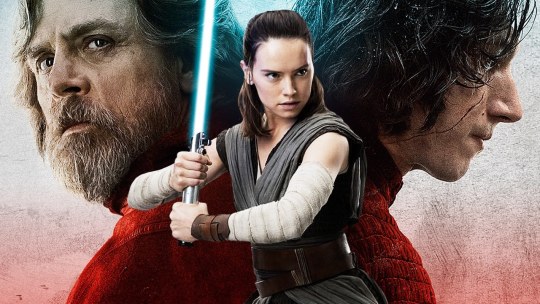
(Spoilers… seriously, a lot of spoilers. Don’t read this if you haven’t seen Star Wars: The Last Jedi because there’s going to be a lot of spoilers for that movie in this post. spoilers. spoilers. spoilers. spoilers. spoilers. spoilers. spoilers. spoilers. spoilers. spoilers. spoilers. spoilers. spoilers. spoilers. spoilers. spoilers. spoilers. spoilers. spoilers. spoilers. spoilers. spoilers. spoilers. SPOILERS. SPOIL-nerf-herding-LERS. Spoilers.)
Star Wars: The Last Jedi has received conflicted reviews from the critics who seem to love it and the moviegoers who have been left feeling confused and a little disappointed. This is different from The Force Awakens, which received generally good reviews, but was criticized for following the same essential plot as A New Hope, where a young orphan, stranded on a desert planet receives a call to action, requiring them to leave home, challenge the Empire and blow up a death star. The first film in the Disney series set the audience up to believe that we were watching something that was more similar to a reboot, than a continuation of the existing story. The Last Jedi takes advantage of this by using the plot of The Empire Strikes Back to subvert these expectations. When you expect Luke to train Rey as Yoda trained him, he refuses. When you expect Snoke to be a complex and mysterious character, he dies without a hint as to where he came from, and when you expect Rey to be the daughter of some important legacy character, she turns out to have no relevant family ties. A lot of this can be summed up by the sentiment expressed in Kylo Ren’s line that was revealed in the trailer. “Let the past die. Kill it if you have to.” Director Rian Johnson seems to be saying the we, as an audience, need to let go of the idea that these movies and the characters that live within them are going to be the same as the old ones if we ever want to move on and allow a new generation to come forward. So why are so many people not liking the new Star Wars? Well, there are a few major structural problems I’d like to point out.
1. Poe and Finn don’t need to be in the movie.
These two characters, while occasionally entertaining, are completely unnecessary to the primary plot of The Last Jedi. It becomes an issue for any story when there are too many subplots. It makes the film feel muddled. In episodes 4, 5 and 6, the camera followed Luke on his mission to become a Jedi and overthrow the empire. Occasionally Luke leaves the main group and the films begin to cut back and fourth between him and everyone else, but most of the original franchise followed the protagonist. Episode 8 splits its time between Rey on the island with Luke, Kylo’s slipping influence under Snoke, Poe’s struggle to help the resistance escape, and Finn’s attempt to shut down a tracking device by infiltrating a casino. The problem is that Finn and Poe’s subplots are completely unnecessary. If you cut straight to the First Order tracking the rebellion and eventually landing on Planet Salty, you’d still have essentially the same movie. Perhaps even with more time to develop Rey as a character. There’s simply too much going on at once and a lot of it is unnecessary.
2. There’s a fine line between subverting expectation and trolling.
Reversing every major plot point from Empire made a bold statement about taking the series in a new direction, but it’s important not to try so hard to be unexpected that you forget to tell a good story. Kylo killing Snoke in a surprise attack before his back-story and motivations could be revealed certainly caught a lot of people off guard, but it also kind of felt like a giant middle finger to every fan who spent hours theorizing about who he might be or where he might have come from. Wouldn’t Johnson have been able to make the same point about not needing to rely on the old series by simply creating a new origin for the Supreme Leader rather than throwing him away entirely? This isn’t the only time this happens either. Turning Luke’s trial in the cave from a jarring scene about self-reflection and the origin of evil, to Rey’s scene where the only deeper meaning she finds is that there is no deeper meaning can be disorienting. These scenes made the movie feel jagged and disconnected, like it was trying so hard not to say the same thing as Empire, that it didn’t say anything at all.
3. It’s afraid to be earnest.
Themes of cynicism are unfortunately becoming more and more common in the film industry. There is a line near the end of Avengers: Age of Ultron where Hawkeye says, “The city is flying, we’re fighting an army of robots and I have a bow and arrow. None of this makes sense.” This is a self-aware nod to the ridiculousness of situations that super hero movies frequently create. Deadpool is basically a two hour-long iteration of this line. The characters who do this are essentially saying, “you can’t make fun of me if I make fun of myself first.” This works in Deadpool because the purpose of the film is to be self-aware and mock the tropes built up by the super hero film industry. It is a meta-comedy. Avengers and Star Wars are not. When Han Solo asks Finn if there’s a trash compacter on the station, he laughs and says there is. This scene is intended to be a nod to episode 4, but Finn shouldn’t know that. He wasn’t there when Luke, Leia and Han were trapped in a trash compactor. When Luke flings away his old lightsaber, we laugh, but only because that isn’t what a Jedi is supposed to do with a cherished heirloom. The characters frequently seem like they’re too cool to actually care about what’s going on, but if the characters don’t care, why should the audience?
4. The film’s message is shallow.
While Star Trek was always known for its explorations of politics and culture, Star Wars spent more of its time ruminating on religion and philosophy. These concepts were the heart of the original films. Star Wars was never so much about the physical battles as it was about the battle of ideas. The Last Jedi seems to be throwing these ideas away, ‘killing the past.’ Yoda burns the tree. Kylo cuts Snoke in half. Rey’s lightsaber breaks. When Luke faces Kylo, the sith sneers and asks if Luke is going to try and save him. Luke refuses, deciding that instead of trying to turn his nephew back to the path of light, the way he did with Vader, a good butt whoopin’ is the more appropriate response. This might kindle some shallow sense of ironic comedy in the moment, but it ultimately leaves the film feeling hollow.
The Last Jedi isn’t without its saving graces. I was drawn in by Rey and Kylo’s mysterious connection, and I cheered as hard as anyone when they fought off the imperial guard back to back. I wouldn’t even go so far as to call it a bad film. It took what Abrams had built and tried to learn from it instead of taking the easy road and re-shooting Empire. Johnson took a risk and tried to make something new, but at least for me, it simply failed to be a Star Wars movie. It didn’t have any of the qualities that made the original franchise memorable. At the end of the day, episodes 4-7 spent a lot of time asking questions, and episode 8 spent three hours asking “who cares?”
1 note
·
View note
Text
2001: A Space Genesis
(50 year old spoilers ahead)
There is a slow building, disconnected setting of the scenes in Kubrick’s 2001: A Space Odyssey. The film has a very post-modern feel, in that it seems to have been designed to invite multiple interpretations rather than giving the viewer a single clear narrative. There are various possibilities for these interpretations, such as HAL taking the role of a woman in a patriarchal society, being invaded and murdered by Dave. From the beginning this film seemed to me like a biblical story being applied to the realms of science and Darwinism.
In the beginning we saw that man’s origin was innocent. We opened on apes that, while not entirely bereft of violence, abided by the laws of the animal kingdom and maintained a place in it. This all changed when the Monolith appeared. We see above it a sun and crescent moon, common symbols of masculinity, femininity, sexuality and the duality of life and death. Like the tree of knowledge in genesis, this object granted these pre-humans the ability to organize under clear leadership, use tools, commit acts of organized violence and most importantly, dominate their environment by amassing food and resources. Not only this but there was a specific scene where we saw a young ape handling a bone, showing us that these traits are passed on.
As we transition to the future, the first thing we see is the bone transitioning to a space ship, showing us that these are both tools. The music shifts from a slow, drum heavy, tribal beat to a more elegant symphony. These transitions show us that the course of human history has been about refining these traits. There is another sexual image as we watch a phallic shaped ship slowly dock, on a round space station. Once inside, we see that the environment is completely sterile. No life has been allowed to thrive except humans here. The tools have become more complex, the arts and sciences have been refined but the goals of humanity are still the same; resources, sex and dominance.
As they leave the space station we see more of this slow, deliberate controlled motion of the ships, everything is intentional. The entertainment that the stewardess’ watch on TV is some form of martial arts tournament, in other words, violence for pleasure. As the ship comes in and they’re eating you can see that their sandwiches are shaped like the Monolith, as if in tribute to the object to which they owe their superiority. Then we see the Monolith again and it’s accompanied by this sound like rapturous wailing. Like the apes, they need to touch it. Again we see the image of duality, above the object, only this time it ends in death rather than domination over life.
In the next segment, we see more of the rectangular shaped food, but more importantly, HAL is shaped like the Monolith. He is enshrined before a white glow. This implies that humanity has evolved to a point where they’ve attempted to create God, the source of all knowledge. HAL is intended to be infallible. While Dave is slow and thoughtful when it comes to things like chess, HAL’s responses are always immediate. Even his voice is fatherly, calm and measured, the way you’d imagine God’s to be. The instant HAL proves to be fallible however, the humans decide to kill him since there is no place for a fallible god. This may represent that dependency upon machines, is not the true path to enlightenment. The knowledge needs to be attained by the human mind.
The final act is about attaining that enlightenment, outgrowing the old ideas about God and attaining all the knowledge in the universe in order to become God. Rather than the sun and moon, this time we see all the planets and moons in perfect, symmetrical alignment, which could represent divinity, as celestial bodies are most often named after gods. He enters a room where he is surrounded by human art and knowledge. Dave represents humanity and in this other dimension, he grows old, leaps through the trials of age. Each time he sees a future version of himself, he becomes it and on his deathbed he sees the Monolith, the symbol of all knowledge. Upon becoming the embodiment of all knowledge, he is reborn as God. Which, in this case, is a large freaky space baby.

0 notes
Text
Like Mickey Mouse

Like Mickey Mouse
By Cody D. Campbell
I wonder about the dreaming dead.
Their lonely fears,
their warm ambitions,
the lust that made their blankets stretch.
I think about their children’s children.
Their early summers,
their elder winters,
the seconds when something made sense.
It hurts to know I’m just like them.
With short breaths,
and long sleep,
watching the hand tick like a gavel.
I wish, but no.
I want, but no.
Immortality is unoriginal.
https://codydcampbell.com/2017/12/12/like-mickey-mouse
2 notes
·
View notes
Text
Just Upgraded My Website!
It’s a little thing, but I’ve been on the fence about buying a domain for my website for a long time. Partially because it seemed like a needless expense, partly because with an extremely common last name like Campbell, I wasn’t sure if I might have to adopt a pen name somewhere down the line. I think the biggest reason though, is because I didn’t feel like a real writer. Now I have my first publication on it’s way and a book that’s almost ready for submission. I finally feel like a writer and I wanted an official domain that didn’t have .wordpress in the middle of it. So if you have a minute and you want to check out some free stories and poetry, now you can find it at codydcampbell.com Thanks for reading guys,
-Cody
0 notes
Text
Do Androids Dream of Blade Runners?

I haven’t had a chance to see Blade Runner 2049 yet. It’s a source of great personal shame for me, but life can be a pretty fierce goalie. Sometimes there’s just no getting around it. A while back, I wrote a critical review of the original. I probably should have posted it a couple weeks ago, back when the Blade Runner fever was in the air, but better late than never, right?... Right?
Well, I’m posting it anyway. (35 year old spoilers ahead.)
EDIT: I’ve now seen 2049. It was everything I could have wanted. Might do a post about it in the future.
One of the first things we see in the very beginning of Ridley Scott’s “Blade Runner” is the administration of the Voight-Kampff test on Leon, a known replicant. The doctor administering the test explains that it’s designed to “provoke an emotional response.” It succeeds and Leon kills the man in an irrational fit of rage. This first scene really gives us all the information that we need in order to place where exactly Nexus-6 replicants fit on three categories of intelligence. They not only have learning abilities, independence and emotion, but also the capability of contemplating the limited nature of their own existence. This existential crisis is the catalyst for their rebellion and what makes the ethical decision to terminate them that much more murky.
The lens through which a majority of the story unfolds is that of Deckard. He has been a Blade Runner for a long time. Presumably, the older models of replicants were less advanced, and therefore his decommissioning them was morally sound. He saw them as machines that were fine when they worked but needed to be decommissioned or “retired” when they malfunctioned. This changes when he’s introduced to Rachel, a replicant who’s thoughts and behavior are so human that she doesn’t even realize that she’s a replicant until Deckard reveals that all of her memories prior to being commissioned belonged to Tyrell’s niece. This information distresses Rachel and Deckard tries to comfort her by restoring the illusion that the memories were her own. It doesn’t work, but this deception is significant never the less because of what it reveals about Deckard. He is lying to protect her feelings, which in and of it self is an acknowledgment that she has feelings and that there is a ‘her’ to protect. This goes against his previous ideas about replicants as simple machines.
When Deckard tracks down Zhora later in the film, he hunts her down and kills her in the street even though she’s committed no crime other than refusing to be a slave. One could argue that Leon and Roy were already murderers even if they did so out of fear for their lives but Zhora was innocent. Deckard is obligated to do this because of his job but that doesn’t save him from the morally reprehensible nature of his crime. Perhaps at this early point in the film he believed that Rachel was some kind of aberration and that the rest of them were still just simple machines.
Rachael saving his life is instrumental in this transition. She’s proven her loyalty to Deckard, a presumed human, over Leon, a fellow replicant. After that he admits he owes her, again recognizing that there is a ‘her’ to owe. He pushes her into a physical relationship when she tries to leave, refusing to let her out the door, forcing her against a wall and telling her what to say. One could argue that Deckard knows that Rachael has feelings for him and he’s forcing her to confront them. It seems more likely however that this is rape. Anything she says or agrees to after that display is under duress. So how do we reconcile this with the idea of Deckard as ‘the good guy?’ It seems that he is a more complicated character than that designation implies. Deckard loves Rachel, but he’s conflicted about her nature and still does not fully recognize her as a whole person. This could be associated with the way many women are treated. There are men who might care about them and have passionate feelings for them, but ultimately struggle with the idea that they are equals, baring complex thoughts, feelings and the right to deny their bodies to men who believe they have a right to them.
As a counterpoint, Roy displays a psychological complexity that is not only intelligent, but also very human. Earlier in the film, Tyrell establishes himself as a sort of God-King. His home is in the peak of a great pyramid, he wears massive glasses that could implicate that he sees everything and most importantly, he creates life. He not only creates it in fact, but he designs it with a woefully limited lifespan and fully endorses the Blade Runners homicidal extermination of any who refuse their role as servants to his design. Roy is afraid to die. Philosopher and psychoanalyst Ernest Becker wrote a book titled “The Denial of Death” in which he explains that some might try to fight existential anxiety by trying to squash death, to exert some method of control over it rather than accepting it as a natural part of the cycle of life. He says that killing other people gives us the illusion that we can control death. To this end, the most significant life that Roy could take, giving him the greatest illusion of control, is Tyrell’s, the flawed god who made him mortal. This is deeply human fear. Becker argues that trying to keep it at bay for as long as possible is at the heart of our culture. The ‘lone wolf’s howl’ that Roy gives after killing Tyrell is traditionally a symbol of tragic hopelessness, as wolves are meant to live and survive as a pack and he is now dying alone.
The final conflict between Roy and Deckard has a lot of religious symbolism. The self-imposed stigmata, the doves ascending into the heavens at the moment of Roy’s death. The replicant proves that he is clearly the superior combatant and yet when the moment of truth arrives, he spares Deckard. This act of mercy can be viewed in a few different ways. You can look at it as Roy forgiving mankind the way Jesus did, a replicant who’s simply sick of killing and wanted to do something good before he dies or as him finally accepting his fate and no longer trying to master death. He laments the loss of his memories and the totality of his experience fading away “like tears in the rain.” In the end, he dies, and it is implied that Deckard may also be a replicant, that he was in fact the same as Roy all along.
So what makes a life? It seems that Blade Runner would argue that the answer isn’t as simple as birth. We are defined by our intelligence, emotional depth, independence and our ability to reflect upon the nature of our own existence. Human beings have historically gone out of our way to find reason to categorize and rank ourselves in order to subjugate those we view as our lessers. The film would argue that we need to forgive each other our differences and, like Roy, simply allow each other to live because in reality, we’re more similar than we would like to admit.
0 notes
Text
Bloodless

A river stands between us brother.
The water passed your lips. You swallowed,
and now you sleep on distant shores.
I wear your hand-me-downs, not crying
to see your ghost in window sills,
dressed in your old skin. I dream,
I breath the void of stolen air,
while the guard dog holds you in his teeth.
I am not strong. I am not you.
I am not strong. I am not you.
The guard dog holds you in his teeth
while I breath the void of stolen air.
Dressed in your old skin, I dream
to see your ghost in window sills.
I wear your hand-me-downs, not crying.
Now you sleep on distant shores.
You swallowed the water passed your lips,
and a river stands between us brother.
0 notes